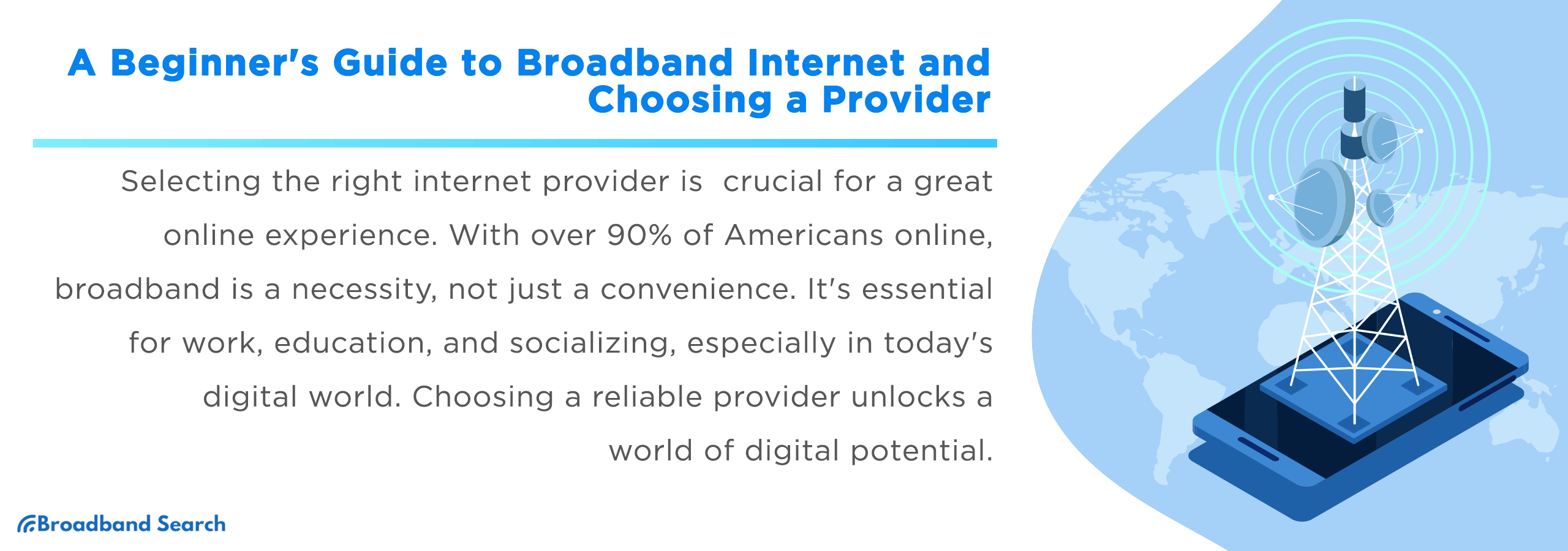One of the initial steps in setting up new internet service for your home involves choosing the right provider, a decision that can significantly impact your online experience. Over 90% of Americans have access to the internet, a testament to its integral role in our daily lives. Many individuals and families could no longer imagine a life without the boundless information, communication, and entertainment avenues it provides. The internet has morphed from a novelty to a necessity, with broadband internet standing at the forefront of this digital evolution due to its high-speed and persistent connectivity.
The importance of broadband internet in today's modern world extends beyond mere convenience. It's a critical enabler of socio-economic activities, education, healthcare, and much more. In a world that increasingly operates online, broadband internet facilitates seamless remote working, learning, and social interaction, especially poignant in the era of social distancing brought on by the COVID-19 pandemic. It not only brings the world closer together but also opens up a realm of opportunities and resources that were previously inaccessible or inconvenient to reach. As such, selecting a reliable broadband internet provider is a crucial step towards unlocking a wealth of digital potential.
Understanding Broadband Internet
Broadband, short for "broad bandwidth", signifies high-speed, continuously active internet connections, representing the fastest internet service available presently. Emerging in the late 1990s, broadband largely supplanted the older dial-up connections that operated on the audible frequency of telephone lines. Broadband, utilizing a different frequency, facilitates a swifter, more reliable online connection, enabling rapid uploading, streaming, and downloading of sizable files. Unlike dial-up, broadband employs a dedicated line solely for data transmission.
Types of Broadband Connections
Broadband connections come in various forms, each with its unique set of advantages and capabilities suited for different usage needs and geographic locations.
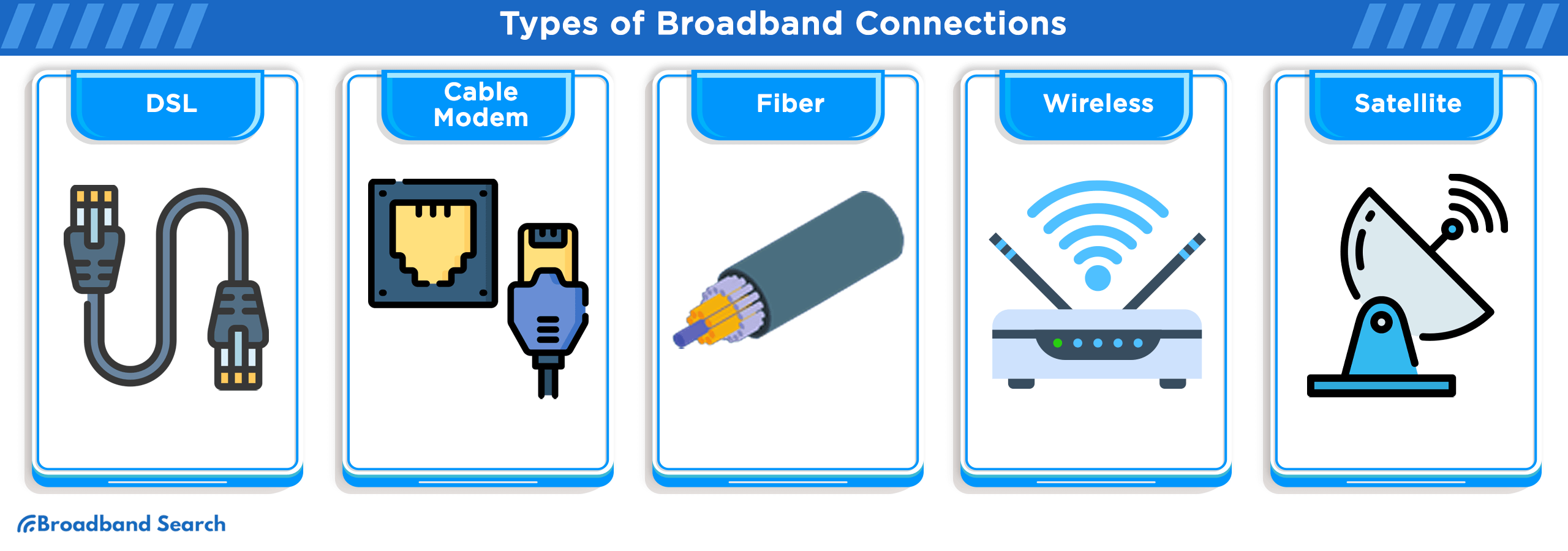
- Digital Subscriber Line (DSL): DSL, a wireline transmission technology, facilitates quicker data transfer via traditional copper telephone lines in homes and businesses. It offers two main types: ADSL, preferred by residential users for its higher downstream speeds, and SDSL, favored by businesses for its equal downstream and upstream speeds, with advanced versions like HDSL and VDSL providing even faster rates.
- Cable Modem: Cable modem service allows cable operators to offer broadband through the same coaxial cables used for transmitting TV signals, without affecting cable TV viewing. The transmission speeds can vary based on the cable modem type, cable network, and traffic load, though they are often on par with or surpass standard residential DSL speeds.
- Fiber: Fiber-optic technology transforms electrical signals carrying data into light, transmitting it through transparent glass fibers as thin as a human hair. It propels data at speeds significantly higher than DSL or cable modems. However, the actual speed experienced can depend on various factors such as the proximity of the fiber to your computer and the service configuration by the provider. The same fiber infrastructure can also deliver voice (VoIP) and video services, including video-on-demand, alongside broadband.
- Wireless: Wireless Fidelity (WiFi) facilitates connection between user devices and local internet services using short-range wireless technology, thus promoting mobility within homes, businesses, or public "hotspots." On the other hand, fixed wireless technologies, employing longer-range directional equipment, provide broadband solutions in remote or sparsely populated regions where other broadband options may be economically unfeasible. Meanwhile, mobile wireless broadband services, despite their widespread availability, often deliver slower speeds in comparison to their wired or fixed wireless counterparts.
- Satellite: Satellite internet is a type of wireless broadband service that provides internet connectivity via satellite communication. In this setup, data is transmitted between a satellite dish at the user's location, a satellite in geostationary orbit (about 22,300 miles above the Earth), and a network operations center (NOC) on the ground.
Speed and Bandwidth
The speed of your internet connection significantly impacts your online experience, determining how quickly you can access or download content from the web. Speed is commonly measured in megabits per second (Mbps) or gigabits per second (Gbps), with 1 Gbps equal to 1,000 Mbps. The higher the speed, the faster data can be transferred to and from your device.
- Mbps: Megabits per second (Mbps) is a standard unit of measurement for internet speed. It indicates the amount of data that can be transferred per second. For instance, if you have an internet speed of 50 Mbps, it means you can theoretically transfer 50 megabits of data each second. This speed is often adequate for regular browsing, streaming in standard definition, and other basic online activities.
- Gbps: Gigabits per second (Gbps) is a unit of measurement that represents a significantly faster data transfer rate compared to Mbps. 1 Gbps equals 1,000 Mbps. Internet plans with speeds measured in Gbps are often termed as gigabit internet services, and they provide extremely fast connections. This level of speed is particularly beneficial for heavy-duty online activities such as streaming in 4K or 8K resolution, hosting high-definition video conferences, online gaming with minimal latency, or supporting multiple users and devices in a busy network environment.
Assessing Your Internet Needs
When it comes to selecting an internet plan, one size does not fit all. Your ideal plan largely depends on how you intend to use the internet. Whether you're a casual browser, a streaming enthusiast, an avid gamer, or someone who relies on a robust internet connection for remote work or learning, assessing your internet needs is a crucial step towards enjoying a satisfactory online experience.
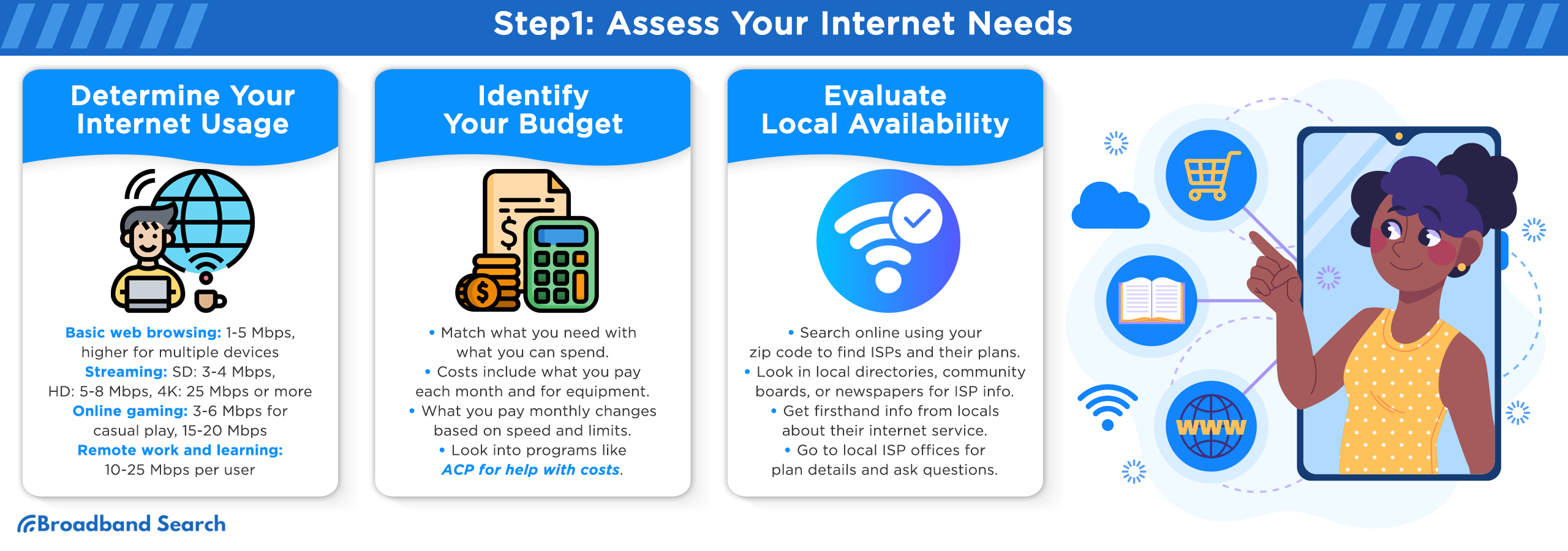
Determining Your Internet Usage
Understanding your internet usage patterns is pivotal in choosing a plan that aligns with your requirements. Here's a breakdown of different internet usage categories and how they impact your choice of an internet plan:
- Basic Web Browsing: Basic activities like web browsing, checking emails, and social media browsing don’t require much bandwidth. A speed of 1 to 5 Mbps is usually sufficient for these tasks. However, if multiple devices will be used simultaneously, you may want to opt for a higher speed to avoid slow-downs.
- Streaming: The bandwidth needed for streaming depends on the quality of the content. For instance:
- Standard Definition (SD) streaming requires 3 to 4 Mbps.
- High Definition (HD) streaming requires 5 to 8 Mbps.
- 4K or Ultra High Definition (UHD) streaming requires 25 Mbps or more.
- Online Gaming: Online gaming can work well with speeds of 3 to 6 Mbps, but a faster connection of 15 to 20 Mbps or more is often recommended to ensure a lag-free experience, especially in competitive gaming scenarios.
- Remote Work and Learning: Remote work and learning require reliable internet with sufficient bandwidth to handle video conferencing, cloud-based applications, and large file downloads/uploads. Recommended speeds range from 10 to 25 Mbps per user, but higher speeds might be necessary for more demanding tasks or multiple users on the same connection.
Identifying Your Budget
While assessing your internet needs is crucial, aligning these needs with your budget is equally important. Internet service costs can quickly add up, encompassing not just monthly service fees but also equipment costs. Here's a breakdown of these expenses:
- Monthly Fees: These fees are recurrent and cover the cost of your internet service. The charges can vary widely depending on the speed, data limits, and the provider you choose. It's advisable to compare different plans and providers to find a package that meets your needs without exceeding your budget.
- Equipment Costs: In addition to the service fees, you may need to budget for equipment costs. This could include the cost of renting or purchasing a modem and router. Some providers may offer equipment rental as part of their package, while others might require you to provide your own equipment.
Government assistance programs like the Affordability Connectivity Program (ACP) can provide some relief by subsidizing internet service and equipment rental costs. The amount of assistance you can receive may depend on various factors such as income, location, and the service provider. These programs can significantly reduce your monthly internet costs, making broadband services more accessible. For a more detailed breakdown of costs and information on government assistance programs like ACP, you may want to explore our blog.
Evaluating Local Availability
Your choice of internet service is significantly influenced by the options available in your locality. Different areas may have varying levels of internet service provider (ISP) competition and technological infrastructure, which in turn affects the speed, reliability, and cost of the internet services available. Here’s how you can go about evaluating local availability:
Checking Your Area for Providers and Options:
- Online Searches: Start by conducting online searches to identify the ISPs operating in your area. There are websites and online tools where you can input your zip code to find a list of available providers and their plans.
- Local Listings: Local business directories or community boards may have listings of ISPs. Additionally, local newspapers or community bulletins may have advertisements from ISPs.
- Neighbor Recommendations: Asking neighbors or local friends about their internet service can provide insightful first-hand information on the quality of service, reliability, and customer support of local ISPs.
- Visit Local ISPs: If possible, visit the local offices of ISPs in your area. This can provide you with a better understanding of the plans they offer and the opportunity to ask questions in person.
- Check Coverage Maps: Some ISPs provide coverage maps on their websites showing the areas they serve and the types of services (like DSL, cable, fiber, etc.) they offer in different locales.
Choosing the Right Internet Service Provider (ISP)
Selecting the right ISP is indeed a pivotal step as it plays a significant role in determining the quality and reliability of your online experience. The process requires a mix of understanding your internet usage needs, evaluating the options available in your locality, and then comparing the offerings of various ISPs to find the one that best meets your requirements and budget.
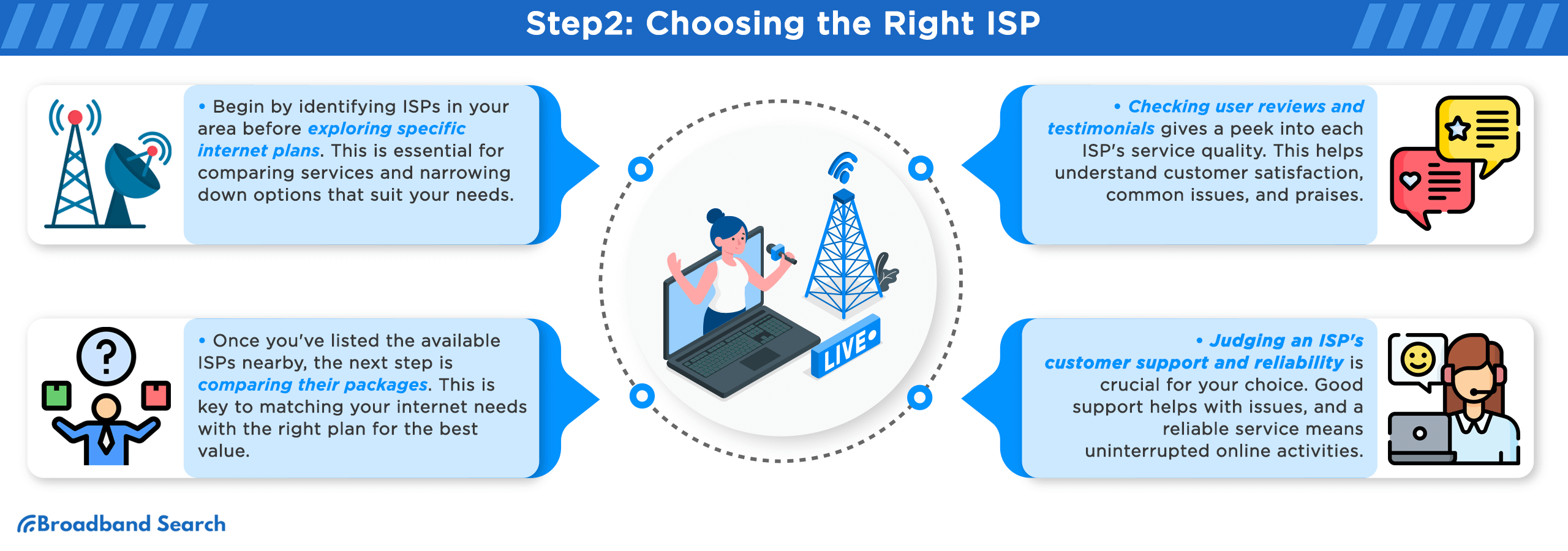
Researching Available ISPs
Before diving into the specifics of different internet plans, it's crucial to first identify which ISPs are available in your area. This initial step lays the foundation for the subsequent comparison of packages and services, helping you to narrow down your options to those that are logistically feasible.
- Major ISPs in Your Area: Major ISPs typically have extensive infrastructure ensuring steady service. Investigate these providers' offerings, as they often have various plans catering to different internet usage levels, ensuring you can find a plan that closely aligns with your requirements. Here are some of the recommendations to help you narrow down your choices.
- Independent Providers: Independent providers may offer personalized service and competitive rates. These smaller entities might have unique packages or better customer service, making them a viable option. It's wise to explore their offerings alongside those of major ISPs to make a well-rounded decision.
Comparing ISP Packages
Once you have a list of available ISPs in your vicinity, the next logical step is to compare the packages they offer. This stage is crucial as it helps you align your internet usage needs with the right plan, ensuring that you get the best value for your money. ISPs often have a variety of packages with differing speeds, data caps, and additional features like bundled services.
- Speed Options: Different ISPs provide varied speed options catering to distinct internet usage patterns. Compare these options, considering your typical internet usage, to select a speed tier that will support your online activities without any hitches.
- Data Caps: Be vigilant about data caps imposed by some ISPs, as exceeding these limits can incur extra charges. If your internet usage is heavy, considering an unlimited data plan could be a wise choice to avoid unexpected costs.
- Additional Features (E.g., Bundled Services): Some ISPs offer bundled services combining internet, TV, and phone services, which could lead to cost savings. Assess the value and convenience of these bundled packages in comparison to standalone internet service.
Reading User Reviews and Testimonials
Delving into user reviews and testimonials provides a real-world glimpse into the quality of service offered by different ISPs. This step enables you to gauge customer satisfaction and discover common issues or praises associated with each provider. Reviews often encompass aspects like speed consistency, reliability, customer service responsiveness, and overall satisfaction.
- Online Resources for Customer Feedback: Utilizing online platforms for customer feedback on different ISPs can provide valuable insights. Forums, review sites, and social media platforms are good resources to gauge customer satisfaction and common issues encountered with particular ISPs.
Customer Support and Reliability
Assessing the customer support and reliability of an ISP is a critical aspect of your selection process. The quality of customer support can significantly impact your overall experience, especially when facing technical issues or seeking clarifications on your service. On the other hand, reliability refers to the consistency and uptime of the internet service, which is crucial for uninterrupted online activities. Whether for work, education, or entertainment, having a reliable internet connection with accessible customer support when needed is paramount.
- Availability of Customer Service: Assess the availability and responsiveness of customer service. Having accessible and effective customer support is crucial for addressing any internet connectivity issues promptly, ensuring a smoother online experience.
- Service Uptime and Reliability: ISPs with high service uptime guarantees and a reputation for reliability are preferable. Consistent service with minimal downtime is crucial for a satisfactory online experience, particularly for those relying heavily on internet connectivity for work, education, or other critical activities.
Contracts and Terms
Navigating the contracts and terms set forth by Internet Service Providers (ISPs) is a crucial step in ensuring a transparent and satisfactory service experience. These contracts encapsulate the legal and service obligations between you and the ISP, covering aspects like service duration, costs, data limits, and termination conditions. A thorough understanding of these terms before entering an agreement can significantly mitigate unexpected issues and costs
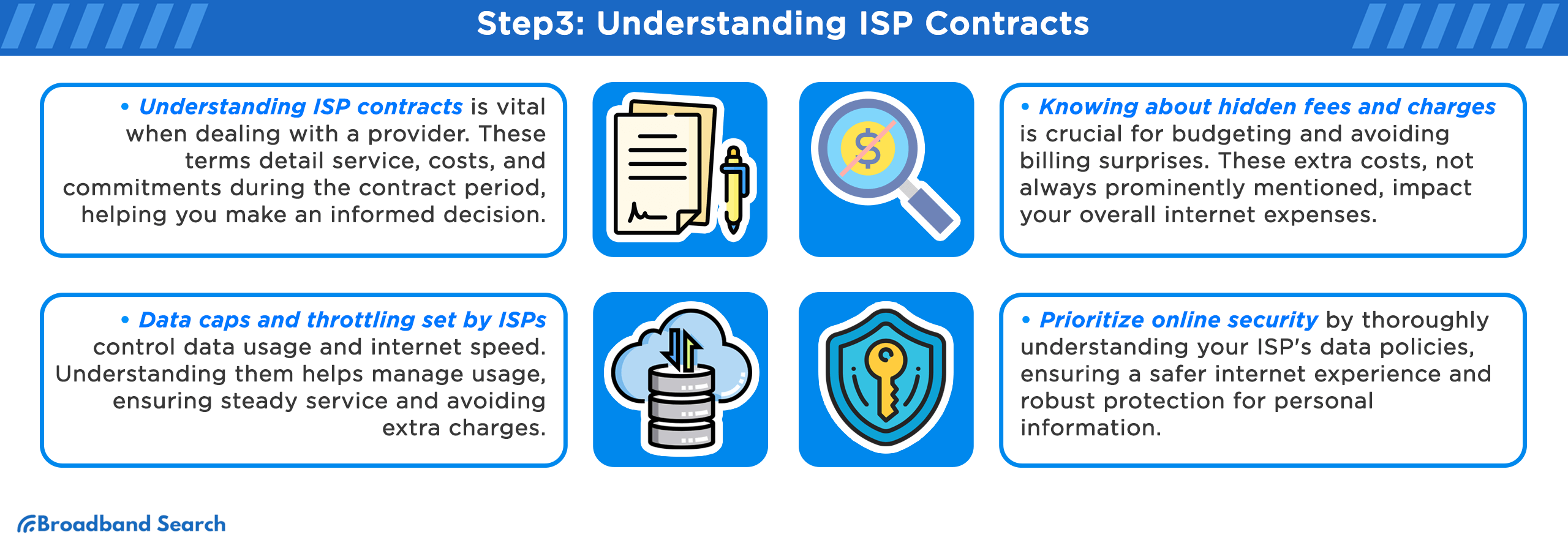
Understanding ISP Contracts
When engaging with an Internet Service Provider (ISP), you'll likely encounter various contractual terms. Understanding these terms is essential as they delineate the service expectations, costs, and obligations during the contract period. This understanding aids in making an informed decision that aligns with your internet needs and financial considerations.
- Contract Lengths (Month-to-month Vs. Long-term): Monthly contracts provide flexibility with no long-term commitment, ideal for those with changing circumstances. On the other hand, long-term contracts, usually spanning a year or more, often come with reduced monthly rates but require a longer commitment, which could be suitable for stable living or business situations.
- Early Termination Fees: Should you opt for a long-term contract, it's important to be aware of early termination fees that may apply if you decide to cancel the service before the contract term ends. These fees can be substantial, so it's crucial to weigh the benefits and drawbacks of a long-term commitment.
Data Caps and Throttling
Data caps and throttling are terms set by ISPs indicating data usage limits and the effect on internet speed. Understanding them helps manage internet usage, ensuring continuous service, and avoiding extra charges. Data caps are preset limits on data usage in a billing cycle, with extra charges if exceeded. Throttling is the intentional reduction in internet speed after reaching a data usage limit, typically to manage network congestion or due to exceeding data caps.
- How Data Limits May Affect Your Usage: Encountering data limits may lead to slowed internet speeds or extra charges, which can disrupt your online activities, particularly if they are data-intensive like streaming, gaming, or large file downloads.
Hidden Fees and Charges
Awareness of hidden fees and charges is fundamental for accurate budgeting and avoiding surprises in your billing. These additional costs, often not prominently disclosed, can significantly affect your overall expenditure on the internet service. A thorough understanding of these hidden costs will ensure a transparent and satisfactory engagement with your ISP.
- Equipment Rental Fees: ISPs often charge additional fees for renting essential equipment like modems or routers. Understanding these fees helps in deciding whether to rent the equipment from the ISP or purchase it outright, which could potentially save money in the long run.
- Installation Charges: Installation charges are one-time fees incurred for setting up the internet service at your premises. Being aware of these charges upfront helps in budgeting accurately and avoiding unexpected costs on your initial bill.
Privacy and Security Considerations
In a digital age, ensuring online privacy and security is paramount. Your ISP plays a crucial role in both these aspects. Understanding the ISP's data collection policies and exploring options to enhance your online security will contribute to a safer internet experience, protecting your personal and sensitive information from potential threats.
- ISP Data Collection Policies: ISPs may collect various data about your internet usage. Understanding what data is collected and how it's used or shared is essential for maintaining your privacy and making informed decisions regarding your internet service provider.
- Options for Enhancing Online Security: There are various measures, like using a Virtual Private Network (VPN) or configuring your router's security settings, that can significantly enhance your online security, providing a safer browsing experience and protecting your data from potential online threats.
Installation and Setup
Transitioning to a new internet service or setting up the internet for the first time requires a structured installation and setup process. This phase ensures that your internet connection is stable, reliable, and ready to meet your online needs. The following sections outline the steps involved in scheduling installation, acquiring necessary equipment, and troubleshooting common installation issues.
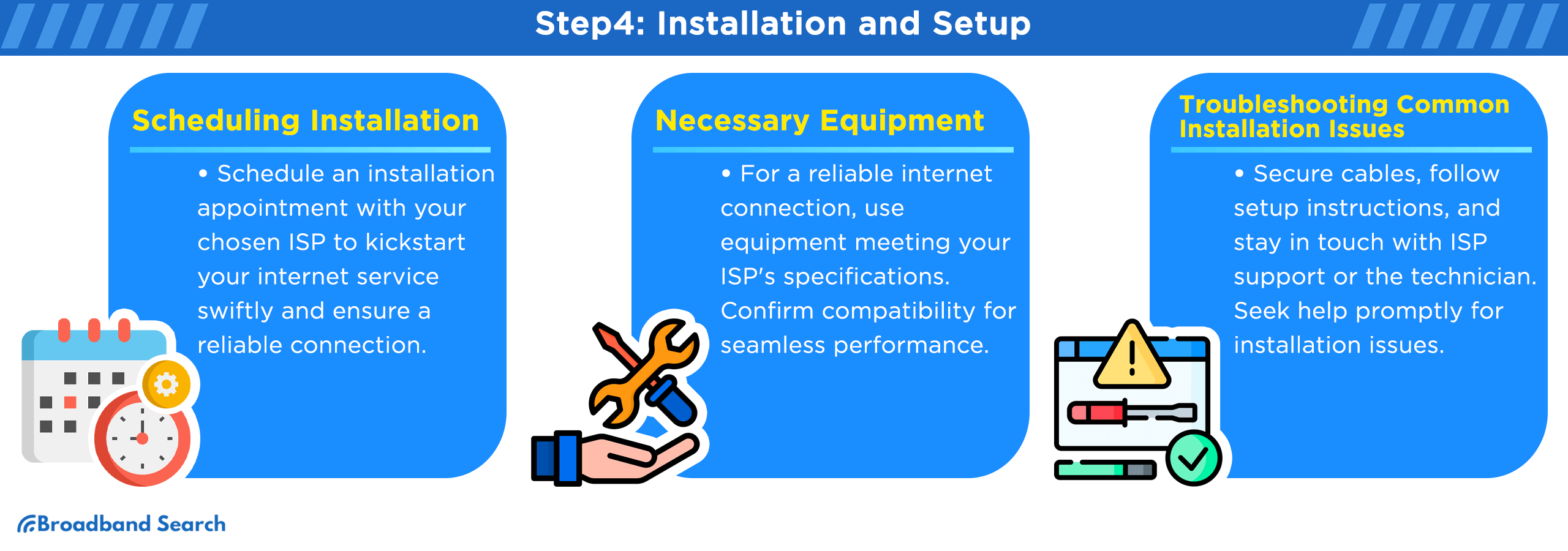
Scheduling Installation
The first step towards getting your internet up and running is scheduling an installation appointment with your chosen ISP.
- Setting Up an Appointment With Your Chosen ISP: Once you've selected your ISP, promptly contact them to schedule an installation appointment. Choose a time that fits your schedule, ensuring you or someone responsible is present during the installation. Early scheduling can expedite the setup process, moving you closer to having a functional and reliable internet connection at your premise.
Necessary Equipment
Having the correct equipment is a cornerstone for establishing a reliable internet connection. The modem and router are crucial components in this setup. While the modem facilitates the connection between your home and your ISP's network, the router distributes this connection to various devices within your premises. Ensuring you have the right equipment that meets the technical specifications required by your ISP is paramount.
- Modems: A modem is essential as it forms the bridge between your home and the ISP's network. It's advisable to have a compatible modem that aligns with your ISP's specifications. You can either purchase a modem or opt to rent one from your ISP, based on your financial considerations and the ISP’s equipment policies.
- Routers: Routers play a pivotal role in dispersing the internet connection to multiple devices within your home. Acquiring a router that can handle your performance needs and the number of devices you intend to connect is crucial. Assess your needs, like the range and speed, to select a router that suits your household’s internet usage.
- Installation Process: The installation process involves setting up your modem and router to establish a connection to the ISP's network. Adhere to the instructions provided by your ISP or the installation technician meticulously. Ensuring that the setup is done correctly is crucial for a stable and reliable internet connection.
Troubleshooting Common Installation Issues
Even with the right equipment and a well-scheduled installation, you might encounter issues that hinder the setup process. These could range from hardware malfunctions to incorrect configurations. Being prepared to troubleshoot common installation issues can expedite the resolution process, ensuring your internet service is up and running smoothly in no time.
- Tips for a Smooth Setup Process: Ensuring all cables are securely connected, following the setup instructions carefully, and having a clear communication channel with your ISP's customer support or the installation technician are key steps for a smooth setup process. If any issues arise during installation, don’t hesitate to seek professional assistance to resolve them promptly and accurately.
Making the Most of Your Broadband Internet
Now that you have your broadband internet set up, ensuring that it operates at its optimal capacity is key to a satisfactory online experience. From optimizing your network to monitoring data usage and dealing with potential slowdowns or outages, there are various steps you can take to make the most of your broadband service. The following sections delve into these aspects, providing insights and tips on how to maintain a robust and efficient internet connection.
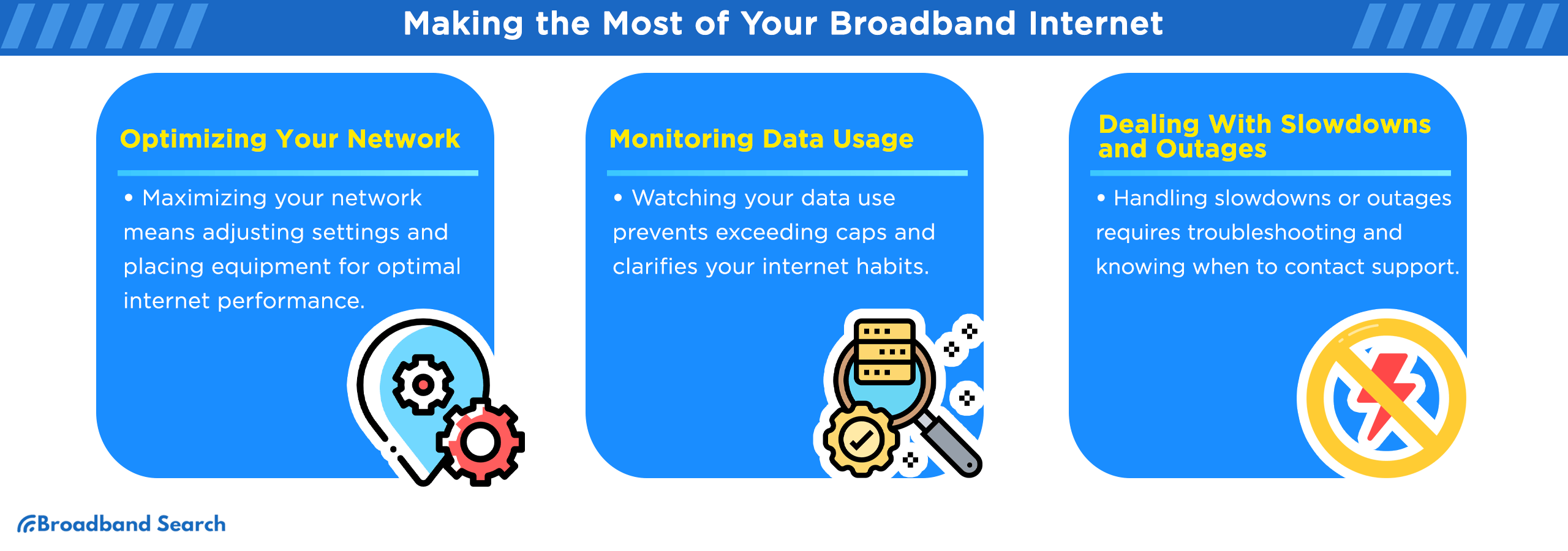
Optimizing Your Network
Optimizing your network entails tweaking settings and ensuring the proper placement of equipment to achieve the best possible internet performance.
- Wi-fi Settings and Security: Ensuring your Wi-Fi settings are correctly configured and your network is securely protected can significantly enhance your internet performance and safety. Adjusting settings like the Wi-Fi channel can help avoid interference, while setting up a strong password and enabling WPA3 encryption can safeguard your network from unauthorized access.
- Placement of Routers: The placement of your router can impact your Wi-Fi signal strength and coverage. Positioning your router in a central location, away from obstructions and electronic interference, can promote a stronger and more reliable Wi-Fi signal throughout your home.
Monitoring Data Usage
Monitoring your data usage helps in avoiding exceeding data caps and understanding your internet consumption pattern.
- Tools for Tracking Your Data Consumption: Utilizing tools like your ISP’s data monitoring service or third-party applications can help track your data usage. These tools provide insights into your consumption patterns, aiding in managing your data usage effectively.
Dealing With Slowdowns and Outages
Experiencing slowdowns or outages can be frustrating, but knowing how to troubleshoot and when to contact customer support can alleviate the situation.
Troubleshooting Steps
- Restart Your Equipment: Begin by restarting your modem and router. This often helps in resolving temporary network glitches.
- Check Cable Connections: Ensure all cables are securely connected to your modem, router, and other devices.
- Test Multiple Devices: Check if the slowdown or outage is affecting all devices or just a particular one. This can help narrow down the issue.
- Check for Outages: Look for any reported outages on your ISP's website or contact them to inquire about potential area-wide issues.
- Update Firmware: Ensure your router and modem firmware is up-to-date. Sometimes, outdated firmware can cause network issues.
- Change Wi-Fi Channels: If you are experiencing slowdowns on Wi-Fi, try changing the Wi-Fi channel on your router to avoid interference.
- Run a Speed Test: Conduct a speed test to measure your internet performance. This can provide useful data if you need to contact customer support.
Contacting Customer Support
- Prepare Your Information: Have your account information and a description of the issue at hand ready.
- Document the Issue: Note down when the issue started, any error messages, and the results of any troubleshooting steps you've taken.
- Contact Support: Reach out to your ISP’s customer support via phone, chat, or email. Explain the issue, provide any necessary information, and follow their instructions.
- Be Patient: Sometimes, resolving network issues can take some time, especially if it's an area-wide outage. Stay patient and cooperative with the support personnel.
- Schedule a Technician: If the issue cannot be resolved remotely, schedule a technician visit. Ensure you're available at the scheduled time for the technician to assess and fix the issue.
- Keep Records: Keep a record of any communication with customer support, including the names of any representatives you speak with, and the solutions provided. This can be helpful for any future interactions or if the issue recurs.
Why Choosing the Right Provider Matters
The right choice can provide a seamless, secure, and cost-effective internet service, enhancing your online activities whether they involve work, learning, entertainment, or staying connected with loved ones. Hence, making an informed decision based on your internet usage habits, budget, and the ISPs' reputation for quality and customer service is paramount.
- Internet Quality and Reliability: The ISP you select plays a pivotal role in determining the quality and reliability of your internet connection. A reputable ISP will have a well-maintained network infrastructure that ensures a stable and high-speed internet connection, minimizing disruptions in your online activities.
- Tailored to Your Needs: Different ISPs cater to a variety of needs by offering an array of plans with varying speeds and data limits. Selecting an ISP that provides plans which align with your specific internet usage habits ensures that your requirements are met without paying for unnecessary extras.
- Customer Support and Service: The level of customer support and service provided by an ISP is vital, especially when facing technical issues or needing assistance with your service. A good ISP will have a responsive and knowledgeable customer support team ready to assist you, ensuring a smooth and hassle-free internet experience.
- Data Privacy and Security: Your ISP has the potential to access a vast amount of information regarding your online activity. Hence, it's crucial to choose a provider that you can trust. Reputable ISPs have robust privacy policies and security measures in place to protect your data and ensure your online safety.
- Cost-Effective Solutions: Opting for the right ISP can also be a cost-effective decision. By selecting a provider that offers competitive pricing, reliable service, and flexible plans, you can save money in the long run. Additionally, some ISPs offer bundled services or promotional discounts that can further reduce your internet expenses.
Future-proofing Your Broadband
The digital landscape is constantly evolving, and ensuring your broadband service remains relevant and capable over time is crucial. Future-proofing your broadband involves staying updated with emerging technologies, regularly revisiting your plan, negotiating with your ISP, and exploring alternative internet options. The following sections delve into these aspects, aiming to provide a roadmap for maintaining a robust and cost-effective internet service over time.
Staying Up-to-date With Technology
Staying abreast of technological advancements can help enhance your internet experience and ensure you're getting the best value.
- Emerging Internet Technologies: Familiarize yourself with emerging internet technologies like 5G, Fiber-optic connections, and others. Understanding these technologies can help you make informed decisions when upgrading or changing your internet service.
- Upgrading Your Plan: As your internet needs evolve, upgrading your plan to accommodate higher speeds or larger data allowances can be beneficial. Regularly review your plan and compare it with the latest offerings to ensure it still meets your requirements.
Negotiating With Your ISP
Negotiating with your ISP can lead to better deals and potentially maintain promotional rates even after the initial period.
- Getting Better Deals: Don’t hesitate to negotiate with your ISP for better deals, especially if you've been a loyal customer. You may be able to get a better rate or additional features at no extra cost.
- Retaining Promotional Rates: If you're on a promotional rate, inquire about the possibility of extending this rate beyond the initial promotion period. Sometimes, ISPs may accommodate such requests to retain loyal customers.
Exploring Alternative Internet Options
Exploring alternative internet options can provide more flexibility and potentially better service.
- 5G and Fixed Wireless: New technologies like 5G and Fixed Wireless are providing more options for high-speed internet. Exploring these alternatives could lead to faster speeds and more reliable internet service.
- Community Broadband Initiatives: Community Broadband Initiatives are local efforts to provide internet service, often with the aim of offering affordable and reliable internet to the community. Investigate local initiatives to see if they provide a viable alternative to traditional ISPs.
Final Thoughts
Making an informed decision on broadband service entails selecting a reliable ISP that aligns with your usage needs and budget, followed by proper installation and setup. Optimizing your network, monitoring data usage, and efficiently handling potential slowdowns or outages contribute to a robust internet connection. As technology evolves, staying updated with emerging internet technologies, negotiating with your ISP for better deals or retaining promotional rates, and exploring alternative internet options like 5G or community broadband initiatives are vital steps for future-proofing your broadband service.
This ongoing process of evaluation and adaptation ensures a high-quality broadband internet service that supports all online activities seamlessly. Taking proactive steps, whether it's researching, negotiating with your ISP, or upgrading your plan, is crucial to maximizing the benefits of broadband internet service, leading to an optimized online experience.
FAQ
Are there any government assistance programs for broadband access?
Yes, there are government assistance programs such as the Affordable Connectivity Program (ACP) that provide financial assistance to eligible households for broadband access. These programs aim to bridge the digital divide and ensure internet accessibility.
Do different providers have different data cap policies?
Absolutely. Different providers have varying data cap policies. Some may offer unlimited data, while others might have defined data limits. It's crucial to understand a provider's data cap policy to ensure it aligns with your internet usage patterns.
What should I do if I experience slow speeds or connectivity issues with my broadband?
If you experience slow speeds or connectivity issues, start by restarting your modem and router. Check for any reported outages with your ISP. If the issue persists, contact your ISP's customer support for further troubleshooting or advice.
Can I get broadband internet in rural or remote areas?
Broadband availability in rural or remote areas has improved, thanks to technologies like satellite internet, fixed wireless, and community broadband initiatives. However, the options might be limited compared to urban areas.
Are there any tools or apps available to optimize my broadband connection?
Yes, there are various tools and apps available to optimize your broadband connection. Tools like speed test apps can help measure your internet performance, while Wi-Fi analyzer apps can help optimize your router settings for better performance. Additionally, some ISPs provide their own apps or tools for managing and optimizing your broadband connection.

